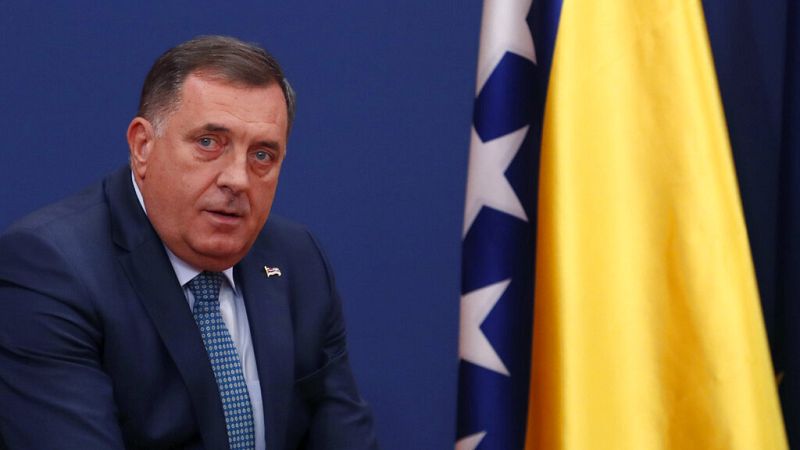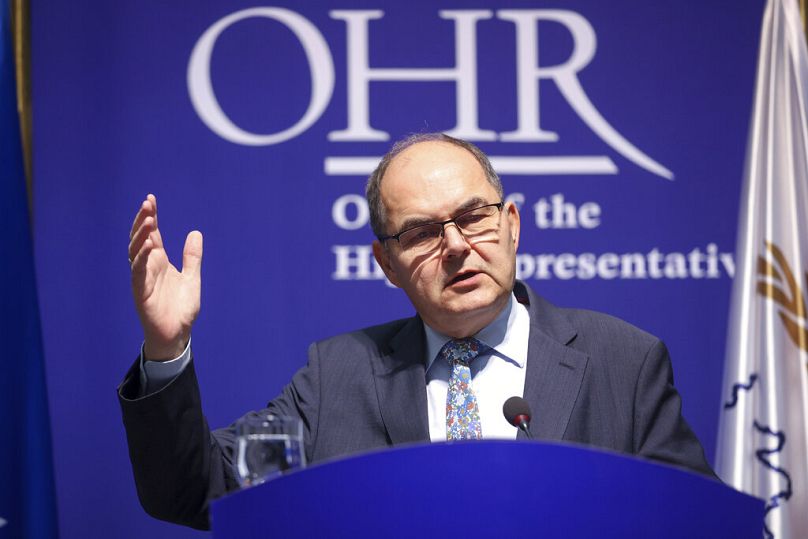High stakes in Bosnia: Dodik's trial could ignite ethnic tensions

Bosnia and Herzegovina finds itself just one step away from renewed institutional conflict after the prosecutor asked Court of BiH judges to deliver a guilty verdict for criminal conduct against the president of Bosnia's Serb-majority entity of the Republika Srpska (RS), Milorad Dodik.
Dodik is accused of promulgating two laws adopted by the RS National Assembly (NSRS) in 2023 related to preventing the implementation of state-level Constitutional Court Rulings and amending legislation.
Both of the laws were blocked by the Western Balkan country's High Representative, German diplomat Christian Schmidt.
Meant to serve as the international community's peace envoy and the final arbiter in high-level disputes, Schmidt acts as a key institutional figure who oversees the implementation of the Dayton Agreement, signed in 1995 to stop the war in the country.
The agreement brought about the end of the war between the ethnic Bosniak, Serb and Croat communities that began in 1992 during the dissolution of the former Yugoslavia.
Dodik is accused of continuing to pursue legislative procedures despite Schmidt's decision, which constitutes a criminal act.
This Wednesday, state-level Prosecutor Nedim Ćosić requested that the court convict Dodik to serve up to five years in prison and ban him from political activity for 10 years.
The Bosnian judges will issue the verdict between Wednesday and next Tuesday.
The RS to make 'radical decisions'?
In Bosnia and Herzegovina, obstructing the decisions of the High Representative is a criminal offence and could result in Dodik's automatic dismissal from his position as president of the RS.
On Monday night, RS officials in the entity's central city, Banja Luka, issued a public statement saying that "the people's assembly, the government and all institutions ... will make radical decisions in response to every verdict of the Court of Bosnia and Herzegovina”.
“Also, all Serb representatives in the institutions of Bosnia and Herzegovina, as well as all employees of the bodies of Bosnia and Herzegovina, will withdraw from the joint institutions and stop working."
In neighbouring Serbia, President Aleksandar Vučić said that he hoped the court would make "wise decisions" in order to prevent Bosnia's further destabilisation.
Last Monday in Budapest, Dodik received similar support from Hungarian Prime Minister Viktor Orbán, who said, "political attacks on Dodik should stop now and he should stop being punished."
Many observers regard the statements as an implicit threat of a unilateral declaration of the RS' secession, which would violate the aforementioned Dayton Agreement.
The international community regards Dodik as a pro-Russian leader in the heart of the Western Balkans. Dodik has openly supported Russian President Vladimir Putin, and has visited him on several occasions since Moscow's all-out invasion of Ukraine in 2022 — one of a handful of officials in Europe to do so.
The case against him and Miloš Lukić, head of the Republika Srpska Official Gazette, started in late 2023. Dodik has repeatedly rejected the legal and constitutional authority of the High Representative.
The RS assembly passed two laws that gave the Serb-majority entity of Bosnia absolute power in elections and referendums — another contested decision as the Dayton Peace Agreement requires all elections to be organised by the state-level Central Electoral Committee.
The RS is one of Bosnia's two entities, or main administrative units, consisting of almost half of the country's territory. The RS and the other entity, the Bosniak- and Croat-run Federation of Bosnia and Herzegovina (FBiH), have some autonomy in how they're governed, overseen by a state-level umbrella government in Sarajevo.
Today


